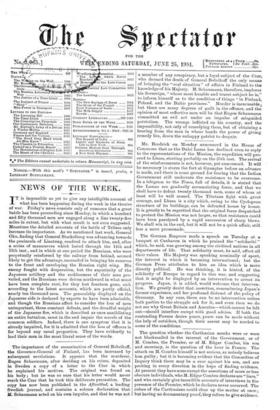I T is impossible as yet to give any intelligible account
of what has been happening during the week in the theatre of war. Friday's news consists only of rumours that a great battle has been proceeding since Monday, in which a hundred and fifty thousand men are engaged along a line twenty-five miles in extent, but with what result is not even suggested. Meantime the detailed accounts of the battle of Telissu only increase its importance. As we mentioned last week, General Oku, finding that General Stackelberg was advancing towards the peninsula of Liaotung, resolved to attack him, and, after a series of manceuvres which lasted through the 14th and 15th inst., and in which at one period the Russians, who were perpetually reinforced by the railway from behind, seemed likely to get the advantage, succeeded in bringing his reserves to the front and enveloping the Russian right wing. His enemy fought with desperation, but the superiority of the Japanese artillery and the recklessness of their men pre- vailed, and the Russians were driven northward in what must have been complete rout, for they lost fourteen guns, and, according to the latest accounts, which are partly official, nearly ten thousand men. The generalship displayed on the Japanese side is declared by experts to have been admirable, and though the Russians affect to consider the loss of men unimportant, these constant defeats, and the dreadful weight of the Japanese fire, which is described as once annihilating an entire battalion, must in the end impair the morale of the common soldiers. Indeed, there is one symptom that it is already impaired, for it is admitted that the loss of officers is far beyond any usual proportion. They have evidently to lead their men in the most literal sense of the words.


























































 Previous page
Previous page